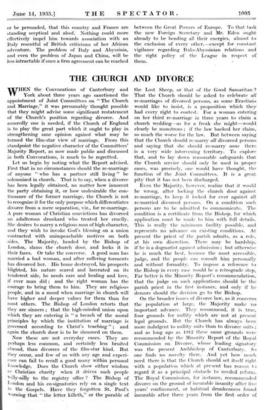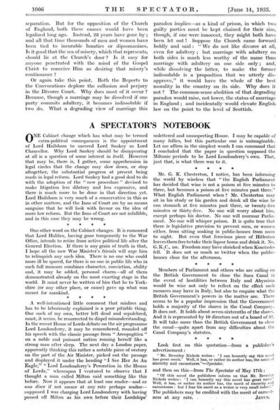THE CHURCH AND DIVORCE
WHEN the Convocations of Canterbury and York about three years ago sanctioned the appointment of Joint Committees on " The Church and Marriage," it was presumably thought possible that they might advise some significant restatement of the Church's position regarding divorce. And assuredly one is needed, if the Church of England is to play the great part which it ought to play in strengthening sane opinion against what may be termed the film-star view of marriage. From this standpoint the negative character of the Committees' Majority Report, as now made public and discussed in both Convocations, is much to be regretted.
Let us begin by noting what the Report advised. First that in no circumstances should the re-marriage of anyone " who has a partner still living " be solemnized in church. That is to say, when a divorce has been legally obtained, no matter how innocent the party obtaining it, or how undesirable the con- tinuance of the former marriage, the Church is not to recognize it for the only purpose which differentiates divorce from a mere separation, viz., for re-marriage. A pure woman of Christian convictions has divorced an adulterous drunkard who treated her cruelly. She desires to marry a religious man of high character, and they wish to invoke God's blessing on a union contracted with unimpeachable motives on both sides. The Majority, headed by the Bishop of London, slams the church door, and locks it in their faces. Or take the converse. A good man has married a bad woman, and after suffering torments has divorced her. - His home destroyed, his prospects blighted, his nature seared and lacerated on its tenderest side, he needs care and healing and love, if ever man did ; and the right woman has the courage to bring them to him. They are religious people, • and in a mood when marriage in church will have higher and deeper values for them than for most others. The Bishop of London retorts that they are sinners ; that the high-minded union upon which they are entering is " a breach of the moral principles by which the institution of marriage is governed according to Christ's teaching " ; and again the church door is to be slammed on them.
Now these are' not everyday cases. They are perhaps less common, and certainly less bruited abroad, than divorces of the film-star kind. But they occur, and few of us with any age and experi- ence can fail to recall a good many 'within personal knowledge. Does the Church show either wisdom or Christian charity when it drives such people willy-nilly to the registry office ? The Bishop of London and his co-signatories rely on a single text in the Gospels. Have they forgotten St. Paul's warning that "the letter killeth," or the parable of the Lost Sheep, or that of the Good Samaritan ? That the Church should be asked to celebrate all re-marriages of divorced persons, as some Erastian's would like to insist, is a proposition which they had every right to contest. For a woman entering on her third re-marriage in three years to claim .a church wedding—as for a freak she might—would clearly be monstrous ; if the law backed her claim, so much the worse for the law. But between saying that the Church should re-marry all divorced persons and saying that she should re-marry none there is a very wide intervening territory. To explore that, and to lay down reasonable safeguards that the Church service should only be used in proper cases, was precisely, one would have thought, the function of the Joint Committees. It is a great pity that it has not been discharged.
Even the Majority, however, realize that it would be wrong, after locking the church door against re-marriage, to keep it locked for ever against all re-married divorced persons. On a condition such persons are to be admitted to communicate. The condition is a certificate from the Bishop, for which application must be made to him with full details. This is really the minimum facility possible, and represents no advance on existing conditions. At present the priest of the parish admits, as a rule, at his own discretion. There may be hardship, if he is a dogmatist against admission ; but otherwise he is much the best, because the most accessible, judge, and the people can consult him personally and without formality. To impose a reference to the Bishop in every case would be a retrograde step. Far better is the Minority Report's recommendation, that the judge on such applications should be the parish priest in the first instance, and only if he demurs should the decision go to the Bishop.
On the broader issues of divorce. law, as it concerns the population at large, the Majority make no important advance. They recommend, it is true, four grounds for nullity which are not at present legal grounds. But the Church has always been more indulgent to nullity suits than to divorce suits ; and as long ago as 1912 these same -grounds were recommended by the Minority Report of the Royal Commission on Divorce, whose leading signatory was the present Archbishop of Canterbury. So one finds no novelty there. And yet how much need there is that the Church should set its elf right with a population which at pre sent has reason to regard it as a principal obstacle to needed reform. The Royal. Commission, for instance, recommended divorce on the ground of incurable insanity after five years' confinement, or habitual drunkenness found incurable after three years from the first order of separation. But for the opposition of the Church of England, both these causes would have been legalized long ago. Instead, 23 years have gone by ; and all that time thousands of men and women have been tied to incurable lunatics or dipsomaniacs. Is it good that the sea of misery, which that represents, should lie• at the Church's door ? Is it easy for anyone penetrated with the mind of the Gospel Christ to conceive Him as desiring that misery's continuance ?
Or again take this point. Both the Reports to the Convocations deplore the collusion and perjury in the Divorce Court. Why does most of it occur ? Because, though a marriage may be dissolved if one party commits adultery, it becomes indissoluble if two do. What a degrading view of marriage this paradox implies—as a kind of prison, in which two guilty parties must be kept chained for their sins, *hough, - if one were innocent; they might both have been let out ! Suppose the Church came forward boldly and said : " We do not like divorce at all, even for adultery ; but marriage with adultery on both sides is much less worthy of the name than marriage with adultery on one side only ; and, while dissolving the latter, to make the former indissoluble is a 'proposition that we utterly dis- approve," it would have the whole of the best morality in the country on its side. Why does it not ? The common-sense abolition of that degrading paradox would raise, not lower, the status of marriage in England ; and incidentally would elevate English law on the point to the level of Scottish.



















































 Previous page
Previous page